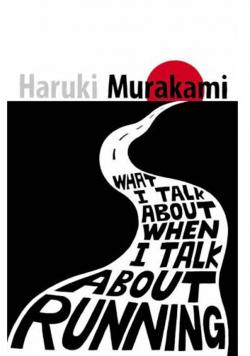What I Talk About When I Talk About Running

By Murakami Haruki
Translated by Philip Gabriel
Harvill Secker (2008)
ISBN-13: 978-0099526155
Review by William Farr
This book is a fascinating account of Murakami’s road to becoming a writer, tied up with his reasons for taking up running. In 1979, Murakami, young and out of University after having studied Greek drama, was at a baseball game. During one inning, a base hit was made which connected off of the sweet spot on the baseball bat. In that moment, the ‘crack’ of the baseball bat caused Murakami to have a flash of insight. The simple thought: ‘I want to write a novel’ popped into Murakami’s head.
At that time, Murakami owned and ran a coffee house cum late-night jazz bar. Not shy when it came to working hard from morning to early morning, Murakami decided to write a novel. He settled into the habit of writing for an hour a night over a period of four months and wrote his first novel “Hear the Wind Sing” (1979), which went on to win the Gunzo magazine literature prize.
Shortly after, and believing that he could make a career out of writing, Murakami sold his jazz bar, and took a two year sabbatical to focus solely on writing. Having run a bar, Murakami was acutely aware of the amount of smoke that he had been inhaling and so decided to become fit. As Murakami had not had a particularly bad experience of running at school, he decided to take up the sport. Murakami was also of the opinion that to become a good writer for the long term would require a high level of fitness which would enable him to concentrate and give him the ability to write on a daily basis for up to three hours. So it was that Murakami took up running, and without fail has since run on average six miles a day six days a week, only ever generally stopping if the weather is inclement.
Since taking up running Murakami has run an average of one marathon a year. One of the most memorable runs Murakami speaks of is his experience of an ultra-marathon. Running sixty miles over eleven hours proved to be mentally exhausting for Murakami and made quite a dent in his enjoyment of running in the short term. Another of Murakami’s enviable runs was in 1982 when he decided to run the original Marathon route in Greece but from Athens. This was photographed at the time and was part of a magazine article. However the magazine was surprised when Murakami told them he actually intended to run the whole of the course and not simply run a short section for photographs only. In the blazing summer sun Murakami ran, but after peeling off his top to run shirtless – a habit he still loves today I am informed –was badly burnt.
More than anything the impression Murakami gives is that he runs so that his mind can rest. Mantras appear to be a strong element in Murakami’s running, as he talks of repetitive self-talk to encourage himself onward to the running task at hand. He runs for nobody except himself. The competitive element of running is simply not there for Murakami. He runs to be part of a wider community of runners. Murakami only competes against himself and his own personal best times.
Today however, Murakami has changed his focus from running marathons to taking part in Triathlons as well. Ever thoughtful and rigorous in his approach to running, throughout the book Murakami discusses reasons for writing in the way that he does, coupled with comments on his own running regime. An extremely superstitious writer, Murakami never gives live interviews, as he believes that his ideas are a precious commodity. Giving interviews and appearing on television according to Murakami would let loose his ideas for novels which he needs for his writing.
It would be interesting to one day read this book in Japanese, as I have heard much of the Murakami style of writing and how he plays with traditional Japanese. Murakami’s favourite music is jazz and so he has a tendency to write in a jazz style with stops, alternating rhythms and melodies. While this jazz style is not immediately apparent in “What I Talk About When I Talk About Running” as it is in books such as “Hard Boiled Wonderland at the End of the World” where the narrative jumps, the book still carries you along on a journey in a way similar to other Murakami books.
The whole book clearly shows that Murakami is an extremely hard working writer and tackles writing not only as a job, but also as a marathon that requires clarity of mind derived from a healthy body. Murakami’s mindset is focused wherever he tends to be living in the world from Massachusetts, to Hawaii, to Tokyo and this book is nothing short of inspirational to runners, writers, and anyone thinking of taking up writing and running.
This review was produced in collaboration with Global Communications Platform.

